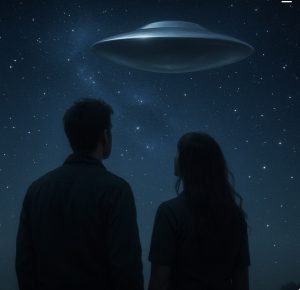
 In this episode of Dreamland, guest host Kelly Chase (Cosmosis, The UFO Rabbit Hole) sits down with researcher Elliott Hauser, following their meeting at the Archives of the Impossible conference. Elliott had spoken on a panel about a groundbreaking metadata experiencer study involving the Strieber Letters and the John Mack Archives—a project at the intersection of technology, archival ethics, and the anomalous.
In this episode of Dreamland, guest host Kelly Chase (Cosmosis, The UFO Rabbit Hole) sits down with researcher Elliott Hauser, following their meeting at the Archives of the Impossible conference. Elliott had spoken on a panel about a groundbreaking metadata experiencer study involving the Strieber Letters and the John Mack Archives—a project at the intersection of technology, archival ethics, and the anomalous.
Elliott, an Assistant Professor of Information Studies at UT Austin, brings a unique lens to experiencer research. His work focuses on how information systems shape our understanding of reality, and he’s currently Co-Lead of Living and Working With Robots, a transdisciplinary project studying human-robot interaction in real-world settings.
Together, Kelly and Elliott explore the complexities of responsibly structuring data from highly personal experiencer accounts, the possibility of open-source phenomenological research, and what robotic experiments might tell us about the nature of non-human intelligences—whether created by us or encountered unexpectedly.
Subscribers, to watch the subscriber version of the video, first log in then click on Dreamland Subscriber-Only Video Podcast link.
The newly “realized” circulatory system is called the Interstitium. It has, of course, always been a part of us. The wonder for me is that it has now been “seen”, in Western Medicine. AND I must ask, what else are we/I missing. The Chinese Medicine already “saw” it, of course. It’s a great analogy for me as I listen to Dr. Hauser talk about studying the archives with this “what are we missing”/what can I see that I don’t expect?
I’m reasonably sure he was talking about the primo vascular system, which has been postulated as the anatomical correlate of the acupuncture meridian system. The evidence for that seems far from conclusive, but here’s one source:
https://onlinelibrary.wiley.com/doi/10.1155/2015/303769
As a licensed acupuncturist since 1996, I could go on about this if anyone wants me to.
The interstitium is fascinating too, but because of the connection to Qi in the discussion, it probably wasn’t what was meant.
I was very surprised when Kelly asked if this was about the humors. No, decidedly not, and the ancient system of humors (body fluids that needed to be in balance) never had empirical and experimental evidence to support it like the acupuncture points and meridians do.
I experience Qi as almost like a physical substance that can be directed and shaped. It amazes me that there are people who don’t perceive it– and sadly some of them are in my profession. Virtually all of my patients and students have easily been able to learn to feel its presence and movement.
Elene, thank you! Your perspective is very informative! I am a physician so likely saw through that lens as well as some of the ways one of the Physicians who worked on understanding this system, Interstium, described his understanding of the function and of what Chinese Medicine physicians said to him in response. (Neil Theine, MD). Again, your deep knowledge of Acupuncture and this “force” is crucial. For me, the marvel is that I need to keep asking myself: “what am I missing? What am I not seeing?” Your comments help me with that. Grateful. S